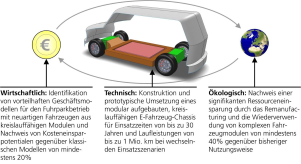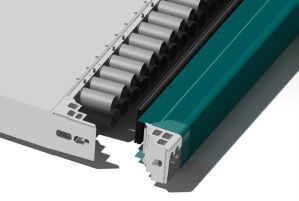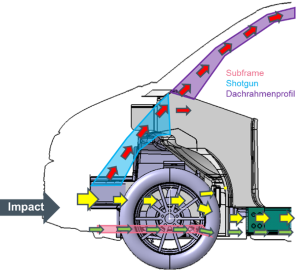The automotive industry is extremely energy and resource consuming along the international value chain. A longer service life of passenger cars is therefore of great ecological and economic advantage. The innovative solution of the reusable open source kit for electrically powered pool vehicles of the “KOSEL” project contributes significantly to resource conservation and recycling management through remanufacturing and reuse.

Durable modules
On average, passenger cars are exported or scrapped after less than 15 years of use. By doubling the mileage, automotive customers could significantly reduce emissions from vehicle production and also the depletion of raw materials. For this reason, “KOSEL” aims to develop particularly durable modules, for example by using low-corrosion and low-fatigue materials such as fiber-plastic composites. Against this background, the project has ambitious technical, economic and ecological goals.

Reusable vehicle platform
In the technical area, the design and prototypical implementation of a modular, recyclable e-vehicle platform for periods of use of up to 30 years with mileages of up to one million kilometres will be carried out. In the economic area, the identification of advantageous business models for fleet operation with new types of vehicles from recyclable modules and proof of cost savings potential compared to classic models. In the ecological field, significant resource savings are to be demonstrated through remanufacturing and the reuse of complex vehicle modules.

Results (Status June 2022)
The aim of the project is to create a modular system that is equipped with durable and at the same time replaceable components. These are linked via open-source interfaces so that individual components can also be installed. The modular system generates a platform of a vehicle with a maximum weight of 3.5 tons.
A demonstrator is currently being produced that shows these interfaces and makes them tangible. To this end, a first version of the complete platform is being built. Like the later vehicle, it is designed to be dismantled and includes several innovative approaches to durable components. At the heart of the durability is the use of fiber composites in key areas of the vehicle.
Lightweight absorbers pultruded from CFRP are used for crash protection. These can easily remain in use for several vehicle life cycles. The sill is formed by a likewise pultruded structure that can provide high rigidity with low weight. The rear axle is designed as a knuckle-joint axle. Driving comfort is provided by a fiber composite leaf spring permanently monitored by sensors. This is also designed to be not only replaceable but adaptable to different bodies. The arrangement is characterized by a particularly low installation height.
The openness to technology is also reflected in the drive system. While a central electric motor is used in the front end, the rear axle is driven by wheel hub motors.
But is the intended longest possible use economical and how much does ecology benefit from this concept? Here, the preliminary results show that a competitive solution is available and, in particular, that the long use of the components leads to reduced resource consumption and thus lower emissions.
Results and their use
The cycle-compatible “KOSEL” mobility concept is intended to serve as a model and trigger further developments in the mobility sector. Especially with an elaborated, cycle-capable e-vehicle platform as a standard solution, development costs and risks can be reduced. The open-source interfaces will also make it attractive for a number of suppliers to provide suitable standard components.
In the long term, the lead company EDAG intends to support young companies in the rapid and cost-effective development of vehicle products based on the modular system. For the fleet operator BSMRG GmbH, the planned longer operating times and reuse options will lead to cost reductions in vehicle operation and thus contribute to competitiveness. For INVENT GmbH, sensor integration and condition monitoring are of particular relevance for a long service life of the components. At Röchling Engineering Plastics, the aim is to supply customers with more durable and robust products and thus to open up new markets.
The Environmental Economics Department of the Technical University of Dresden is developing a method for ecological and economic optimization using life cycle assessment for the new vehicle concept. For the Fraunhofer IWU and the Emden-Leer University of Applied Sciences, the results to be obtained in this project are an important intermediate step on the way from basic research to concrete implementation in practice, i.e. technology transfer.
The results expected from this project form the basis for a foreseeable future utilization by various contractual partners in the automotive industry. In addition, licenses will be granted to interested third parties as far as possible.
Publications
Project flyer of the funding measure (German / English) (March 2021)
The project flyers offer an insight into the contents and goals of the ReziProK projects and present first results in each case.
Project sheets of the funding measure (German) (August 2019)
The project sheets provide a brief overview of the individual projects and their goals.
Contributions to the ReziProK Transfer Conference in June 2022
Poster (German) (June 2022)
Presentation (German) (June 2022)
Contributions to the ReziProK Kick-off event in December 2019
Poster - in German (December 2019)
Presentation - in German (December 2019)
Picture credits: Fraunhofer IWU; Fraunhofer IWU; EDAG Engineering GmbH
